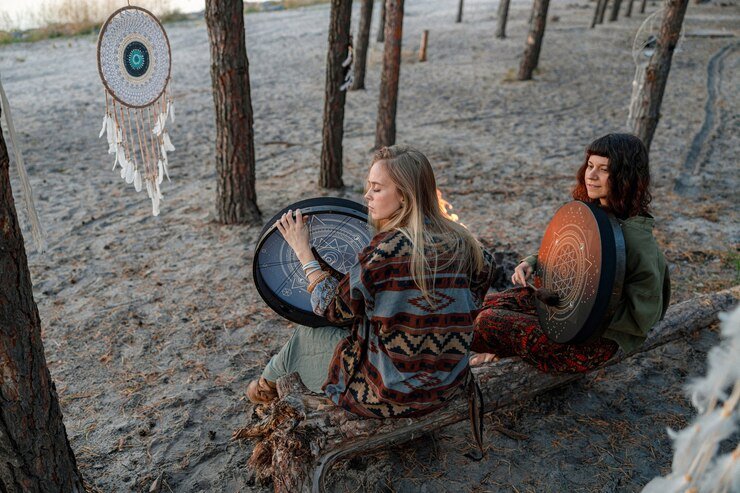The Native American Groups of Galena, Illinois
With its rich history and scenic landscapes, Galena, Illinois, holds a significant place in the annals of Native American history. Long before European settlers arrived, various Native American tribes thrived in this region, each contributing to the area’s cultural and historical tapestry.
The Meskwaki (Fox) Tribe
The Meskwaki, also known as the Fox tribe, were one of the prominent Native American groups that inhabited the region around Galena, Illinois. They were part of the Algonquian language family and were known for their resilience and strong warrior culture. The Meskwaki people primarily engaged in agriculture, hunting, and trading, utilizing the region’s fertile lands and abundant wildlife.
The Sauk Tribe
The Sauk tribe, closely related to the Meskwaki, also lived in the Galena area. Like their counterparts, the Sauk were skilled farmers and hunters. They cultivated crops such as corn, beans, and squash, which were staple foods in their diet. The Sauk were known for their complex social structures and vibrant cultural practices, which included elaborate ceremonies and festivals.
The Ho-Chunk (Winnebago) Tribe
Another significant tribe in the Galena region was the Ho-Chunk, also known as the Winnebago. The Ho-Chunk people have a deep connection to the land and consider it sacred. They were semi-nomadic, moving with the seasons to hunt, fish, and gather food. The Ho-Chunk played a crucial role in the fur trade with European settlers, exchanging furs, beads, and tools.
Cultural Practices and Traditions
Each tribe had unique cultural practices and traditions that enriched the Galena region. The Meskwaki and Sauk tribes, for instance, held powwows, which were gatherings that included dancing, singing, and storytelling. These events were vital for maintaining social bonds and passing down traditions through generations.
The Ho-Chunk tribe, on the other hand, celebrated the Green Corn Ceremony, a significant event that marked the beginning of the harvest season. This ceremony involved rituals to give thanks for the crops and ensure a bountiful harvest in the future.
European Contact and Its Impact
The arrival of European settlers in the 17th and 18th centuries profoundly impacted the Native American tribes in the Galena region. The fur trade initially brought economic opportunities but eventually led to conflicts over land and resources. The Black Hawk War of 1832, named after the Sauk leader Black Hawk, was a significant conflict that resulted from these tensions. The war ultimately led to the displacement of many Native American tribes from their ancestral lands.
Legacy and Preservation
Today, the legacy of these Native American tribes is preserved through various cultural and historical initiatives. Museums and cultural centres in Galena and surrounding areas offer insights into the rich heritage of the Meskwaki, Sauk, and Ho-Chunk tribes. Efforts are also being made to protect and restore sacred sites and artefacts, ensuring that future generations can learn about and appreciate these tribes’ contributions to the region’s history.
Final Thoughts
Understanding the history of Native American groups in Galena, Illinois, provides a deeper appreciation for the region’s cultural heritage. The Meskwaki, Sauk, and Ho-Chunk tribes each played a crucial role in shaping the area’s history and left a lasting legacy that continues to be honoured today.
Questions and Answers
Q: Which Native American tribes lived in the Galena, Illinois region? A: The Meskwaki (Fox), Sauk, and Ho-Chunk (Winnebago) tribes were the primary Native American groups in the Galena region.
Q: What were the main activities of the Meskwaki tribe? A: The Meskwaki tribe primarily engaged in agriculture, hunting, and trading.
Q: How did European settlers impact the Native American tribes in Galena? A: European settlers brought economic opportunities through the fur trade but also led to conflicts over land and resources, resulting in events like the Black Hawk War.
Q: How are the cultural practices of these tribes preserved today? A: Museums, cultural centres, and preservation efforts help protect and restore sacred sites and artefacts, ensuring that these tribes’ cultural practices are honoured and remembered.
Native American tribes, Galena Illinois, Meskwaki tribe, Sauk tribe, Ho-Chunk tribe, Native American history, cultural practices, Black Hawk War, European settlers, preservation efforts
Enter Password to Unlock: 30/30 Attempts Remaining








